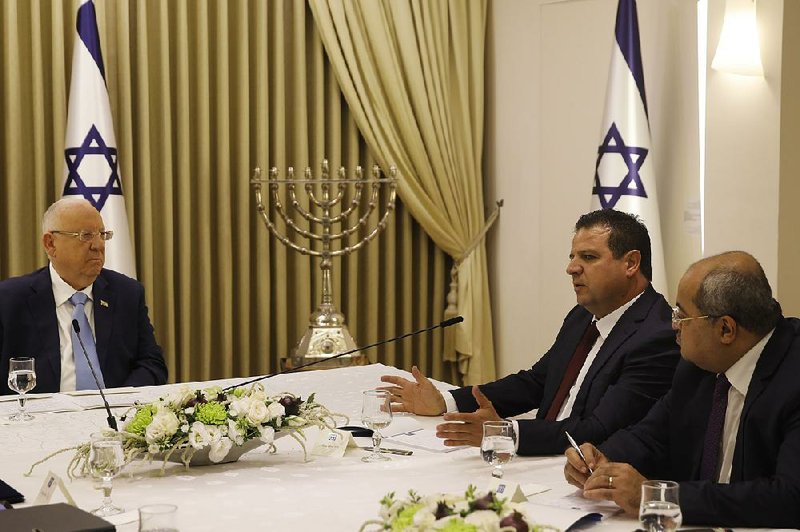JERUSALEM -- Israeli President Reuven Rivlin summoned the prime minister and his chief rival to a joint meeting Monday night in hopes of brokering a deal for a unity government.
Rivlin met with Prime Minister Benjamin Netanyahu and former military chief Benny Gantz for almost two hours at the president's official residence, with Rivlin eventually leaving the competitors to talk alone.
The two party leaders issued a joint statement afterward, saying they would meet again today. They gave no further details about their discussions.
The statement added that Rivlin had invited the two men back to the presidential residence on Wednesday for a third meeting.
"We have taken a significant step forward tonight, and now the first challenge is to establish a channel of direct communication between the sides," Rivlin said in a statement after the meeting.
The Israeli president is responsible for choosing a candidate for prime minister after national elections. That task is usually a formality, given to the leader who has the best chance of forming a stable majority coalition in the 120-seat parliament, the Knesset.
But last week's election, the second in less than five months, ended in deadlock. Neither Netanyahu, who has led the country for the past decade, nor Gantz is able to put together a coalition with smaller allied political parties. That has greatly complicated Rivlin's task. A unity deal between the large parties is seen as perhaps the only way out of the impasse.
"People expect you to find a solution and to prevent further elections, even if it comes at a personal and even ideological cost. This is not the time to exclude people." Rivlin told the two leaders.
Rivlin has spent the past two days meeting with leaders of all parties elected to parliament.
A total of nine parties won seats in the election last week. Gantz's centrist Blue and White party came in first, with 33 seats, trailed by Netanyahu's Likud, with 31. With the smaller allied parties, a total of 55 lawmakers have thrown their support behind Netanyahu, and 54 in favor of Gantz, leaving both men short of the required 61-seat majority.
That has made Avigdor Lieberman, leader of the ultranationalist Yisrael Beitenu party, the key power broker. Lieberman controls eight seats, enough to give either candidate the prime minister's post. However, he has refused to endorse either candidate. He's demanded they join him in a broad, secular unity government.
Lieberman is a former ally of Netanyahu's, but his refusal to join Netanyahu's coalition after April elections triggered the Sept. 17 repeat vote. Lieberman objected to what he said was excessive influence by the religious parties, leaving Netanyahu without a majority and forcing him to call the new election.
The president has made it known he would like to see the two major parties work together in the next government, possibly with Gantz and Netanyahu each taking a turn as prime minister.
At the same time, Netanyahu is facing an indictment on corruption charges, and he could boost his chances of avoiding prosecution if, in a unity government, he gets the first turn as prime minister. Israeli law does not require a sitting premier to resign if indicted. But if Netanyahu is charged while he is in office, he would come under heavy pressure to step down.
Gantz, meanwhile, has pledged never to serve in a coalition with Netanyahu's Likud party unless someone other than Netanyahu is in charge.
In a break from custom, a coalition of Arab parties endorsed Gantz, the first time they had recommended a candidate since 1992. Arab parties have usually refrained from an endorsement, not wanting to be seen as legitimizing Israeli policies they consider discriminatory or hostile toward their Palestinian brethren.
Arab leaders said the decision was aimed at toppling Netanyahu, whose anti-Arab rhetoric has offended the country's Arab minority. It was also aimed at expressing Arabs' growing political influence, as Arabs now make up about 20% of Israel's population.
Rivlin's call for a face-to-face meeting led some to hope that a breakthrough would be possible, paving the way for a coalition government and avoiding a third election in a year.
"Israelis will feel that if anyone can find a solution, it's President Rivlin," said Jason Pearlman, a former media adviser to Rivlin. "He wants to sit them down and let them sort it out."
Rivlin is expected by Wednesday to designate either Gantz or Netanyahu to cobble together a government.
Whoever Rivlin chooses will be given 28 days, plus a 14-day extension, to secure coalition agreements. If that candidate fails, the president can permit a further 28 days. and After that, Knesset members would have an opportunity to recommend, by majority vote, a third potential candidate they believe might be successful. That person would then have 14 days to try to form a government.
Information for this article was contributed by Steve Hendrix and Ruth Eglash of The Washington Post; and by Josef Federman of The Associated Press.
A Section on 09/24/2019
